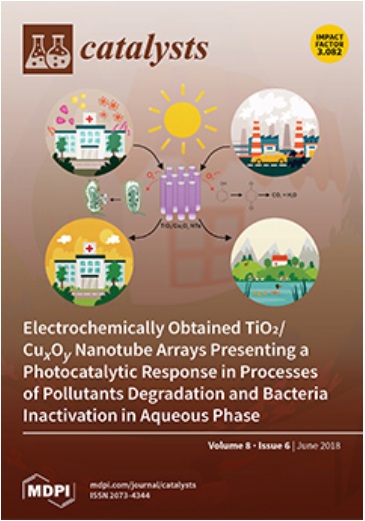TiO2/CuxOy nanotube (NT) arrays were synthesized using the anodization method in the presence of ethylene glycol and different parameters applied. The presence, morphology, and chemical character of the obtained structures was characterized using a variety of methods—SEM (scanning electron microscopy), XPS (X-ray photoelectron spectroscopy), XRD (X-ray crystallography), PL (photoluminescence), and EDX (energy-dispersive X-ray spectroscopy). A p-n mixed oxide heterojunction of Ti-Cu was created with a proved response to the visible light range and the stable form that were in contact with Ti. TiO2/CuxOy NTs presented the appearance of both Cu2O (mainly) and CuO components influencing the dimensions of the NTs (1.1–1.3 µm). Additionally, changes in voltage have been proven to affect the NTs’ length, which reached a value of 3.5 µm for Ti90Cu10_50V. Degradation of phenol in the aqueous phase was observed in 16% of Ti85Cu15_30V after 1 h of visible light irradiation (λ > 420 nm). Scavenger tests for phenol degradation process in presence of NT samples exposed the responsibility of superoxide radicals for degradation of organic compounds in Vis light region. Inactivation of bacteria strains Escherichia coli (E. coli), Bacillus subtilis (B. subtilis), and Clostridium sp. in presence of obtained TiO2/CuxOy NT photocatalysts, and Vis light has been studied showing a great improvement in inactivation efficiency with a response rate of 97% inactivation for E. coli and 98% for Clostridium sp. in 60 min. Evidently, TEM (transmission electron microscopy) images confirmed the bacteria cells’ damage.

